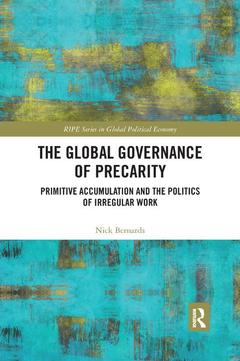The Global Governance of Precarity Primitive Accumulation and the Politics of Irregular Work RIPE Series in Global Political Economy Series
Auteur : Bernards Nick

?Standard? employment relationships, with permanent contracts, regular hours, and decent pay, are under assault. Precarious work and unemployment are increasingly common, and concern is also growing about the expansion of informal work and the rise of ?modern slavery?. However, precarity and violence are in fact longstanding features of work for most of the world?s population. Lamenting the ?loss? of secure, stable jobs often reflects a strikingly Eurocentric and historically myopic perspective.
This book argues that standard employment relations have always co-existed with a plethora of different labour regimes. Highlighting the importance of the governance of irregular forms of labour the author draws together empirical, historical analyses of International Labour Organisation (ILO) policy towards forced labour, unemployment, and social protection for informal workers in sub-Saharan Africa. Archival research, extensive documentary research and interviews with key ILO staff are utilised to explore the critical role the organization?s activities have often played in the development of mechanisms for governing irregular labour.
Addressing the increasingly widespread and pressing practical debates about the politics of precarious labour in the world economy this book speaks to key debates in several disciplines, especially IPE, global governance, and labour studies. It will also be of interest to scholars working in development studies and critical political economy.
Nick Bernards is Assistant Professor of Global Sustainable Development at the University of Warwick
Date de parution : 12-2019
15.6x23.4 cm
Date de parution : 02-2018
15.6x23.4 cm
Thèmes de The Global Governance of Precarity :
Mots-clés :
Irregular Labour; ILO Effort; Precarity; Relative Surplus Populations; Work; ILO’s Approach; Labour; Migrant Labour System; Marx; Unfree Labour; Governance; Coercive Labour Recruitment; Political Economy; Rural Urban Labour Migration; ILO; Primitive Accumulation; ILO’s Project; Silent Compulsion; ILO Official; Traditional Slavery; ILO’s Convention; Child Trafficking; Global Labour Studies; Combatting Child Trafficking; Social Reproduction; Social Protection Department; Artisanal Gold Mining; Commercial Insurance Markets; Informal Apprenticeships; African Workers; Forced Labour Convention; WEP



